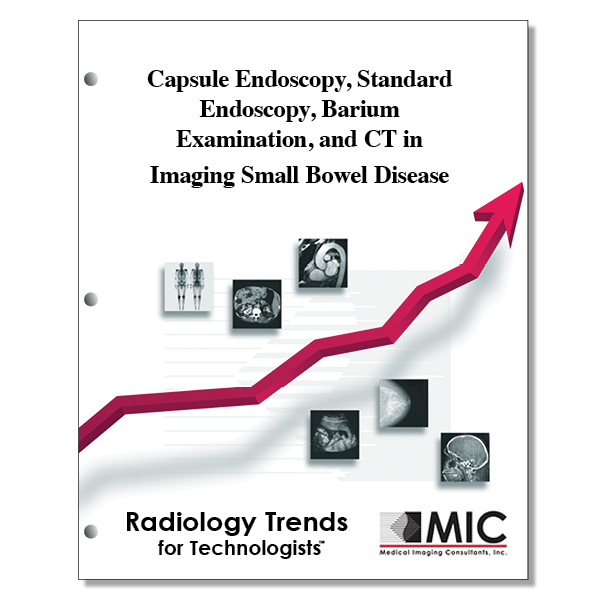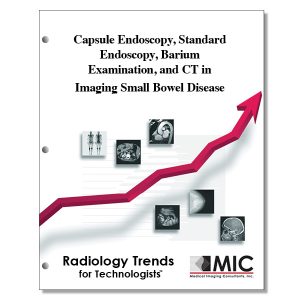

Capsule Endoscopy, Standard Endoscopy, Barium Examination, and CT in Imaging Small Bowel Disease
A thorough overview of the capsule endoscopy technique along with its advantages, disadvantages, clinical indications and complications and how it compares to other methods of imaging small bowel disease.
Course ID: Q00172 Category: Radiology Trends for Technologists Modalities: CT, Nuclear Medicine, Radiography2.0 |
Satisfaction Guarantee |
$24.00
- Targeted CE
- Outline
- Objectives
Targeted CE per ARRT’s Discipline, Category, and Subcategory classification for enrollments starting after February 14, 2023:
[Note: Discipline-specific Targeted CE credits may be less than the total Category A credits approved for this course.]
Computed Tomography: 1.00
Procedures: 1.00
Abdomen and Pelvis: 1.00
Magnetic Resonance Imaging: 1.00
Procedures: 1.00
Body: 1.00
Nuclear Medicine Technology: 0.50
Procedures: 0.50
Gastrointestinal and Genitourinary Procedures: 0.50
Radiography: 1.00
Procedures: 1.00
Thorax and Abdomen Procedures: 1.00
Registered Radiologist Assistant: 1.00
Procedures: 1.00
Abdominal Section: 1.00
Radiation Therapy: 1.00
Patient Care: 0.50
Patient and Medical Record Management: 0.50
Procedures: 0.50
Treatment Sites and Tumors: 0.50
Outline
- Introduction
- Capsule Endoscopic Technique
- Advantages and Disadvantages of Capsule Endoscopy
- Indications for Capsule Endoscopy
- Obscure Gastrointestinal Bleeding
- Crohn Disease
- Additional Potential Indications
- Contraindications for Capsule Endoscopy
- Lesions Detected at Capsule Endoscopy
- Arteriovenous Malformations
- Small Bowel Tumors
- Ulcers
- Due to Crohn Disease
- NSAID-induced Ulcers
- False-negative and False-positive Findings at Capsule Endoscopy
- Complications of Capsule Endoscopy
- Conclusions
Objectives
Upon completion of this course, students will:
- learn what capsule endoscopy is
- understand the most common indication for capsule endoscopy
- learn about the recording apparatus that the patient wears
- learn how fast the images are acquired
- learn how long the battery life is
- understand the main advantage of capsule endoscopy
- learn about the mucosal diseases that capsule endoscopy can detect
- understand there are disadvantages of the study
- learn the disadvantages of capsule endoscopy
- understand the image quality of the camera
- understand what obscure gastrointestinal bleeding is
- learn what overt obscure gastrointestinal bleeding is
- learn what occult obscure gastrointestinal bleeding is
- know one of the common indications of capsule endoscopy
- know that capsule endoscopy can out perform other radiologic studies
- know what percentage of Crohn disease studies benefit from capsule endoscopy
- learn other indications that capsule endoscopy is used for
- be able to list some contraindications of capsule endoscopy
- know what a relative contraindication is
- know the most common abnormality of obscure gastrointestinal bleeding
- learn about Arteriovenous malformations
- learn about small bowel neoplasms
- learn the examination of choice for detecting small bowel neoplasms
- understand the evaluation that capsule endoscopy provides
- learn about studies performed that detect more tumors that radiologic imaging
- learn what the majority of small bowel ulcers detected by capsule endoscopy are caused by
- learn the differences between capsule endoscopy and standard endoscopy
- know what type of patients undergo capsule endoscopy
- know what other studies can be performed for patients who cannot undergo capsule endoscopy
- know another cause of small bowel ulcers and strictures
- learn some clinical manifestations of NSAID-induced small bowel disease
- learn what can be missed by capsule endoscopy
- know what condition is not commonly detected using capsule endoscopy
- know some false-negative results can occur with capsule endoscopy
- why some patients may need surgical removal of the capsule
